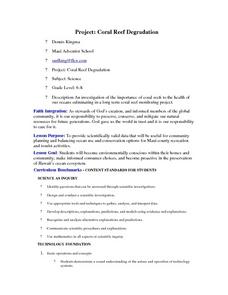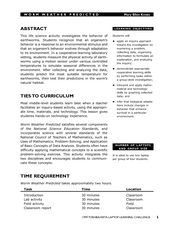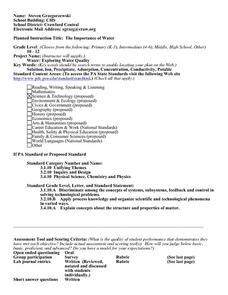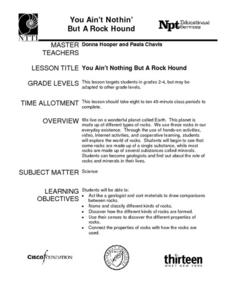Curated OER
SIM Ecosystem
Students identify and interpret the concept of an ecosystem and the potential impact humans have on ecosystems. They also proficient in organized and methodical Internet searches. Finally, students become proficient with public...
Curated OER
It's in the Garbage
Students analyze how studying garbage relates to methods of archaeology. They examine garbage to determine things about their culture and relate that to prehistoric peoples.
Curated OER
Coarl Reef Degradation
Students explore methods of preserving Hawaii's ocean ecosystem. Using underwater cameras, students take pictures of the underwater reef. They perform activities to determine the history and degradation of the coal reef. While...
Curated OER
Biodegradable Plastics
Learners prepare a type of biodegradable plastic. They design method(s) to compare its properties with some common plastics that are readily available in the market. They later advance to identifying variables in an experiment and fair...
Curated OER
Investigating How Pollutants Travel Through Groundwater
Learners determine how pollutants can travel though sediment and explore methods of pollutant removal. They conduct an experiment on porosity and permeability of soils and simulate an EPA "pump and treat" method for removing subsurface...
Curated OER
What are Igneous Rocks and How are They Formed?
Crystals form before your very eyes! What sixth grader wouldn't enjoy this lesson plan on igneous rock formation? Using hot Salol, junior geologists observe the crystal formation process as the material cools. This comprehensive lesson...
Curated OER
Worm Weather Predicted
Students examine worm habitats. In this animal habitats lesson, students participate in a lab activity that requires them to explore the adaptations that earthworms make to their environment.
Curated OER
Yeast Cells and Their Environment
Middle schoolers create their own experiment in which they have yeast cells growing in liquid environments. They examine the relationship between humans and microorganisms. They also practice using the scientific method.
Curated OER
Testing the Hypothesis
Students create and conduct various experiments to determine the origin of a family artifact, and then determine whether their results were successful. Students summarize their results and evaluate whether their hypotheses were correct.
Curated OER
How Can You Study Things You Can’t See Like: Atoms?
Learners simulate how scientists studied things they can't see like atoms. In this chemistry lesson, students predict what is inside the numbered obsertainers. They design a way to investigate what's inside without opening it.
Curated OER
Let's Grow Some Microbes!
Students investigate the effect that sterile and non-sterile environments have on growth of microbes. In this biology lesson plan, students observe the appearance of sample test tubes for 7 days. They explain why some test tubes'...
Curated OER
Hatching Brine shrimp
Second graders investigate the life cycle using brine shrimp as an example. They conduct observations by watching the shrimp hatch out of cysts. Students design simple experiment to structure an observation. The experiment is approved...
Curated OER
Multiplying Microbes
Students examine environmental conditions that effect bacteria growth. They culture bacteria, design and conduct an experiment, and identify the conditions that effected the bacteria growth using the scientific method.
Curated OER
The Importance of Water
Students explore the importance of water. They discuss why water is important and students design an experiment that evaluates the water quality and methods of improving water quality. Students perform testing and report their findings.
Curated OER
What are Metamorphic Rocks and How are They Formed?
Even though the student handouts are not included in the write-up, this lesson contains the instructions for terrific activities to use when teaching middle schoolers about metamorphic rocks. First, they compare granite to gneiss and...
Texas State University
Earth: Deposition and Lithification
Geology geniuses analyze sediment samples with a hand lens and sort according to physical characteristics. They also learn about the processes of cementation, compaction, and lithification within the rock cycle. The lesson plan is...
Curated OER
Water Pressure Blaster
Third graders complete an experiment to introduce them to the concept of water pressure. In this water pressure lesson plan, 3rd graders create pressure in a water bottle and observe the force of water that is created.
Curated OER
Examining Infiltration Rates of Various Soil Types
Students formulate their own hypothesis, determine which variables are important to test their hypothesis, design an experiment in which they collect data. They utilize instruments and tools to measure, calculate, and organize data.
Curated OER
Classroom Science Fair Project
Students explore the skills and information needed to complete a science fair project. They follow guidelines to create an document their science fair project.
Curated OER
Time-Lapsed Observations
Students explore timed observations for science investigations. They record ideas on a chart related to a classroom closed terrarium. They repeat their observations for several days and time observations for changing shadows during the...
Curated OER
Heating Ice
Students explore through inquiry what it is like to heat ice and the results that can be observed. There is a graph that is created to keep track of data. There are questions that are answered to promote the use of the scientific method.
Curated OER
What is the Rock Cycle and Its Processes?
Geology beginners examine three different rock samples and determine their origin by their characteristics. By making and recording observations, they become familiar with features of igneous, metamorphic, and sedimentary rock types....
Curated OER
You Ain't Nothin' But a Rock Hound
Here is an excellent activity on rocks! In it, learners explore the world of rocks through the use of video, hands-on activities, and cooperative projects. This outstanding plan is chock full of terrific activities, websites, streamed...
Curated OER
Sounds Like Great Science!
A phenomenal lesson on sound is here for your third graders! In it, learners engage in hands-on activities, watch video, take part in Internet activities, and complete tasks in cooperative groups in order to explore the world of sound...

























